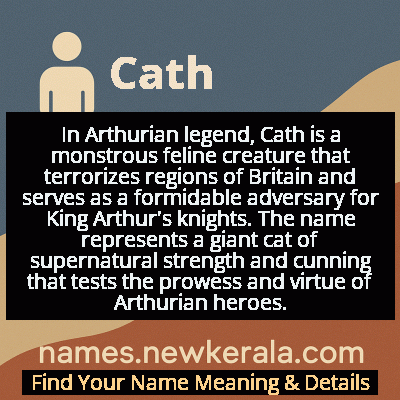Cath Name Meaning & Details
Origin, Popularity, Numerology Analysis & Name Meaning of Cath
Discover the origin, meaning, and cultural significance of the name CATH. Delve into its historical roots and explore the lasting impact it has had on communities and traditions.
Name
Cath
Gender
Male
Origin
Arthurian
Lucky Number
5
Meaning of the Name - Cath
In Arthurian legend, Cath is a monstrous feline creature that terrorizes regions of Britain and serves as a formidable adversary for King Arthur's knights. The name represents a giant cat of supernatural strength and cunning that tests the prowess and virtue of Arthurian heroes.
Cath - Complete Numerology Analysis
Your Numerology Number
Based on Pythagorean Numerology System
Ruling Planet
Mercury
Positive Nature
Adventurous, dynamic, curious, and social.
Negative Traits
Restless, impatient, inconsistent, prone to indulgence.
Lucky Colours
Green, white.
Lucky Days
Wednesday.
Lucky Stones
Emerald.
Harmony Numbers
1, 3, 9.
Best Suited Professions
Sales, marketing, travel, entertainment.
What People Like About You
Versatility, charisma, adventurous spirit.
Famous People Named Cath
Cath Palug
Legendary Monster
Defeated numerous knights before being slain in Arthurian legend
Cath of the Mountains
Mythical Beast
One of the Three Great Plagues of Anglesey in Welsh triads
Cath Bwrdd
Legendary Creature
Featured in Celtic folklore as a monstrous Welsh cat
Name Variations & International Equivalents
Click on blue names to explore their detailed meanings. Gray names with will be available soon.
Cultural & Historical Significance
Extended Personality Analysis
The personality of Cath as depicted in Arthurian legend combines bestial ferocity with supernatural intelligence, creating a formidable antagonist that challenges both the physical and moral strength of knights. The creature exhibits relentless aggression and territorial dominance, attacking any who enter its domain with savage efficiency. Unlike mere animals, Cath demonstrates strategic thinking, using ambush tactics and environmental advantages to overcome armored opponents. This cunning nature suggests a consciousness beyond simple animal instinct, positioning the monster as a genuine test of Arthurian chivalry rather than just physical combat. The Cath's personality embodies the untamable wildness that Arthur's kingdom sought to control, representing forces that cannot be reasoned with or domesticated. Its relentless nature and near-invulnerability create an opponent that requires not just strength but wisdom and courage to overcome, making its defeat a significant achievement in any knight's career and reinforcing the Arthurian ideal that true heroism involves confronting and mastering the most dangerous aspects of both the external world and human nature itself.
Modern Usage & Popularity
In contemporary contexts, Cath remains almost exclusively within specialized domains of Arthurian scholarship, fantasy literature, and gaming culture. The name sees periodic revival in fantasy novels that reimagine Arthurian legends, where it often appears as a fearsome monster or mythical beast classification. Within role-playing games and fantasy video games, Cath serves as inspiration for monster designs, particularly in settings that draw upon Celtic or Arthurian mythology. The name maintains academic relevance among medievalists studying the transmission of Celtic mythological elements into Arthurian romance. As a personal name, Cath is exceptionally rare and primarily used in creative contexts rather than for actual people, preserving its identity as a legendary entity. Recent years have seen minor increased recognition through popular media adaptations of Arthurian stories, though it remains a niche reference understood mainly by enthusiasts of medieval literature and mythology rather than achieving mainstream familiarity.
Symbolic & Spiritual Meanings
Symbolically, Cath represents the confrontation between civilization and wild nature, serving as an embodiment of the chaotic forces that threaten established order. In Arthurian context, the monster symbolizes the untamable aspects of the natural world that must be conquered to create and maintain civilized society. The creature's feline nature connects it to themes of hidden knowledge, intuition, and supernatural insight, drawing from Celtic traditions where cats were often guardians of mystical wisdom and portals to the Otherworld. Cath's monstrous transformation from ordinary animal to legendary threat also symbolizes the dangerous potential of nature when corrupted or empowered by supernatural forces. The repeated theme of knights confronting and ultimately defeating Cath represents the Arthurian ideal of mastering one's fears and overcoming seemingly insurmountable challenges through courage and virtue. As a creature born of magic in some traditions, it also serves as a cautionary symbol about the unintended consequences of wielding supernatural power and the responsibility that comes with confronting mystical forces beyond human understanding.

